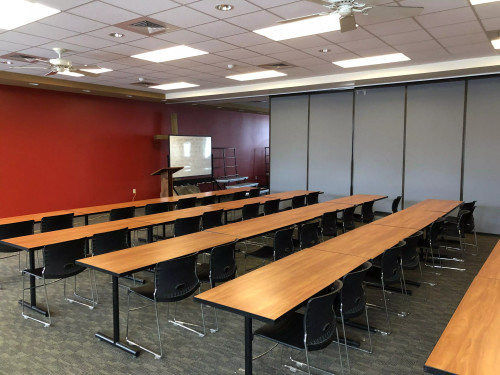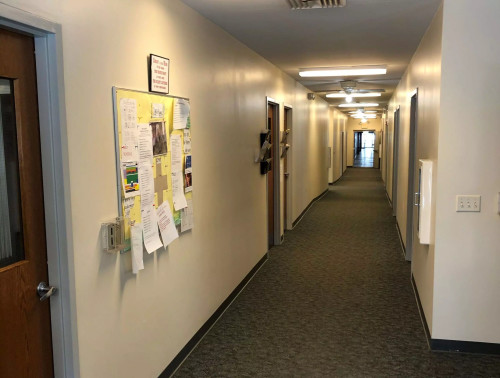






Great Lakes Adult and Teen Challenge - Men's Center of Hope
Treatment Focus
This center primarily treats substance use disorders, helping you stabilize, create relapse-prevention plans, and connect to compassionate support.
Primary Level of Care
Offering intensive care with 24/7 monitoring, residential treatment is typically 30 days and can cover multiple levels of care. Length can range from 14 to 90 days typically.
This provider hasn't verified their profile's information. Are you the owner of this center? Claim your listing to better manage your presence on Recovery.com.
Treatment Focus
This center primarily treats substance use disorders, helping you stabilize, create relapse-prevention plans, and connect to compassionate support.
Primary Level of Care
Offering intensive care with 24/7 monitoring, residential treatment is typically 30 days and can cover multiple levels of care. Length can range from 14 to 90 days typically.
Private Pay
You pay directly for treatment out of pocket. This approach can offer enhanced privacy and flexibility, without involving insurance. Exact costs vary based on program and length of stay. Contact the center for specific details.
Great Lakes Adult and Teen Challenge - Men's Center of Hope
Great Lakes Adult and Teen Challenge - Men's Center of Hope
About Great Lakes Adult and Teen Challenge - Men's Center of Hope
Adult and Teen Challenge Great Lakes is a Christian Discipleship program for women with drug and alcohol addictions. The program provides a faith-based curriculum with a 1-year commitment to progressing through their 4 levels of care: Recovery, Renewal, Restoration, and Transition. Adult and Teen Challenge focuses on spiritual, emotional, and physical healing, and offers social and educational training to prepare women for life post-addiction. The treatment center is operated as a nonprofit, so fees are very low. The focus is on permanent recovery, no matter how long it takes.
4 Levels of Care
Level 1(14 weeks): Recovery Residents attend classes that emphasize recognizing and changing destructive thoughts and beliefs, understanding the basic needs they were attempting to fulfill through substance use, and learning coping skills to combat cravings.
Level 2 (12 weeks): Renewal Residents participate in the physical, mental, emotional, and spiritual work that it takes to heal the wounds that are often at the root of addiction.
Level 3 (12 weeks): Restoration and Healing Residents learn more about purpose in life, and how to enter into a future that is free from substances. This phase helps establish a solid foundation for the future, helping residents uncover their unique gifts and talents.
Level 4 (12 weeks): Transition Residents begin taking practical steps toward putting what they’ve learned into action. Residents find employment and housing, learn how to manage their time and resources, and start to become leaders who give back to their community.

Center Overview
Treatment Focus
This center primarily treats substance use disorders, helping you stabilize, create relapse-prevention plans, and connect to compassionate support.
Pricing and Program Length
Estimated Center Costs
Center pricing can vary based on program and length of stay. Contact the center for more information. Recovery.com strives for price transparency so you can make an informed decision.
Levels of Care





Your Care Options
Specializations
Alcohol
Using alcohol as a coping mechanism, or drinking excessively throughout the week, signals an alcohol use disorder.
Drug Addiction
Drug addiction is the excessive and repetitive use of substances, despite harmful consequences to a person's life, health, and relationships.
Christian
Through surrender and commitment to Christ, patients refocus the efforts and source of their recovery with clinical and spiritual care.
Religion-Based Track
Patients can join faith-based recovery tracks to approach recovery with others in their faith, healing in a like-minded group with similar goals.
Who We Treat
Approaches
Christian
Through surrender and commitment to Christ, patients refocus the efforts and source of their recovery with clinical and spiritual care.
Therapies
Pastoral Counseling
Based on religious principles, this branch of counseling combines spirituality with psychotherapy.
Substances We Treat
Alcohol
Using alcohol as a coping mechanism, or drinking excessively throughout the week, signals an alcohol use disorder.
Cocaine
Cocaine is a stimulant with euphoric effects. Agitation, muscle ticks, psychosis, and heart issues are common symptoms of cocaine abuse.
Drug Addiction
Drug addiction is the excessive and repetitive use of substances, despite harmful consequences to a person's life, health, and relationships.
Ecstasy
Ecstasy is a stimulant that causes intense euphoria and heightened awareness. Abuse of this drug can trigger depression, insomnia, and memory problems.
Heroin
Heroin is a highly addictive and illegal opioid. It can cause insomnia, collapsed veins, heart issues, and additional mental health issues.
Psychedelics
Hallucinogenic drugs—like LSD—cause euphoria and increased sensory experiences. When abused, they can lead to depression and psychosis.
Methamphetamine
Methamphetamine, or meth, increases energy, agitation, and paranoia. Long-term use can result in severe physical and mental health issues.
Opioids
Opioids produce pain-relief and euphoria, which can lead to addiction. This class of drugs includes prescribed medication and the illegal drug heroin.
Languages
Care Designed for Your Needs
Special Considerations
Religion-Based Track
Patients can join faith-based recovery tracks to approach recovery with others in their faith, healing in a like-minded group with similar goals.





